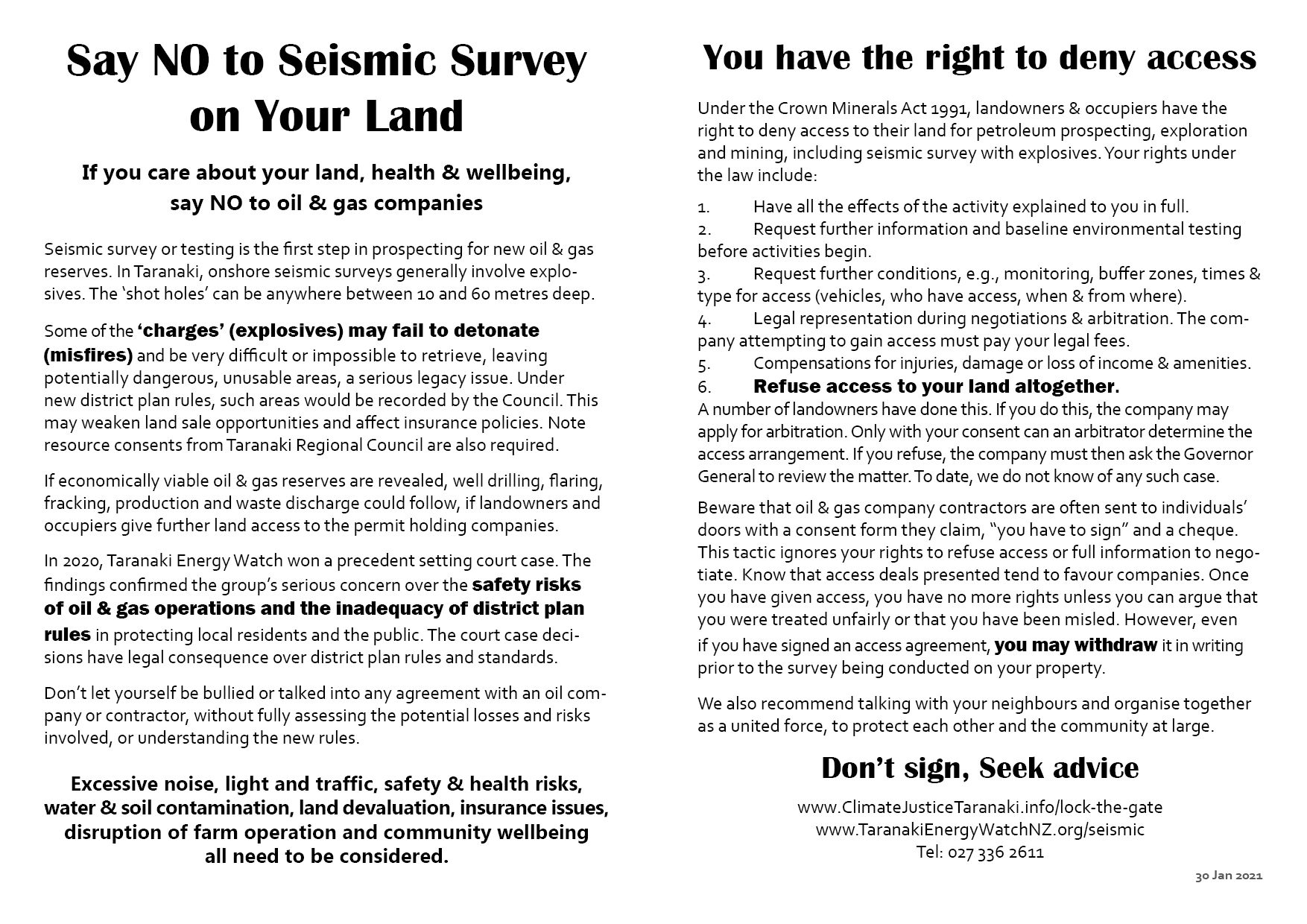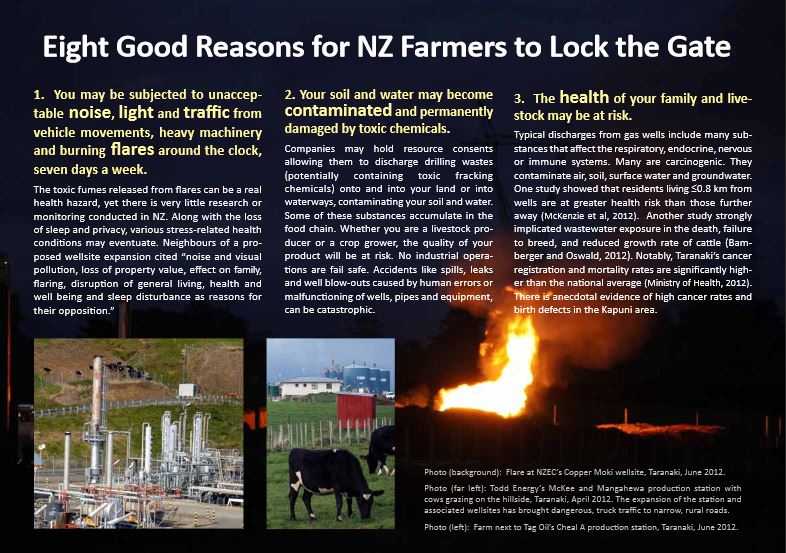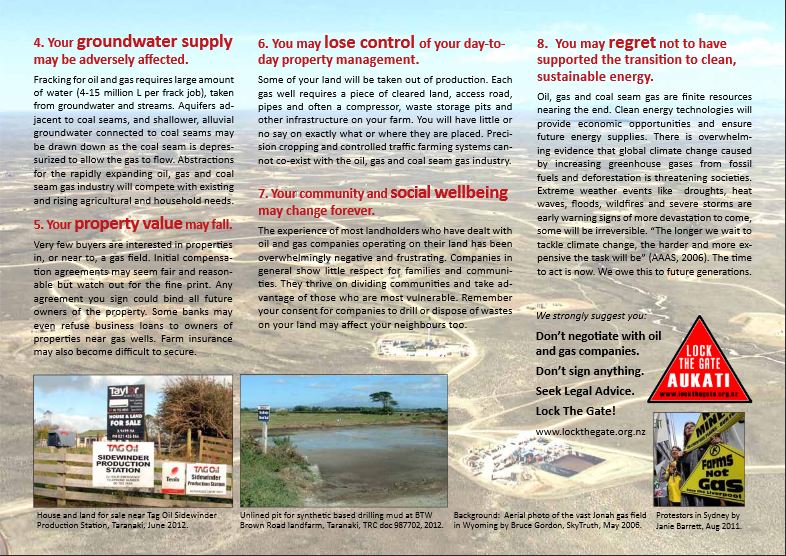Say NO to oil & gas companies
 Seismic survey/testing is the first step in finding/prospecting for new or additional oil & gas reserve. In Taranaki, onshore seismic surveys generally involve explosives. The ‘shot holes’ can be anywhere between 10 and 60 metres deep. Some of the ‘charges’ may fail to detonate (misfires) and be very difficult or impossible to retrieve, leaving potentially dangerous, unusable areas – a serious legacy issue. Under new district plan rules, such areas would be recorded by the Council. This may weaken land sales opportunities and may affect insurance policies. Note that resource consents from Taranaki Regional Council are also required.
Seismic survey/testing is the first step in finding/prospecting for new or additional oil & gas reserve. In Taranaki, onshore seismic surveys generally involve explosives. The ‘shot holes’ can be anywhere between 10 and 60 metres deep. Some of the ‘charges’ may fail to detonate (misfires) and be very difficult or impossible to retrieve, leaving potentially dangerous, unusable areas – a serious legacy issue. Under new district plan rules, such areas would be recorded by the Council. This may weaken land sales opportunities and may affect insurance policies. Note that resource consents from Taranaki Regional Council are also required.
If economically viable oil or gas reserve is revealed by the seismic survey, well drilling, flaring, fracking, production and waste discharge could follow, if landowners and occupiers give further land access to the permit holding companies.
Don’t let yourself be pressured or talked into any agreement with an oil company or contractor without fully assessing the potential losses and risks involved, or understanding the new rules.
Consider the Eight Good Reasons to Lock Your Gate:
- Once access is given, you may be subjected to unacceptable noise, light and traffic from vehicle movements, heavy machinery and burning flares 24/7, depending on the activities, whether it’s seismic survey, well drilling, fracking or production.
- Your soil and water may become contaminated and permanently damaged by toxic chemicals.
- The safety and health of your family and livestock may be at risk.
- Your groundwater supply may be adversely affected.
- Your property value may fall and farm insurance become insecure.
- You may lose control of your day‐to‐day property management.
- Your community and social well-being may change forever.
- You may regret not to have supported the transition to renewable energy.
Note: FMG Insurance has said they would not insure farms with fracking operations onsite : “Our Underwriters have confirmed we exclude cover of Fracking and anything related to this activity. Fracking is outside of FMG’s preferred risk profile and is not something we would be willing to cover as we do not insure any risks relating to the mining industry.” (2 Sept 2013)
Landowners & occupiers have the right to deny access
Neither a permit under the Crown Minerals Act 1991 or a consent under the Resource Management Act 1991 issued by local authorities give companies the right of access to land.
The Crown Minerals Act 1991 lays out in detail the rights of landowners and occupiers re access to land for petroleum prospecting, exploration and mining, including seismic surveys with explosives.
Article 53 of the Act specifies that for any activities (except for minimum impact activity), a permit holder needs to have an access arrangement, either (a) agreed in writing between the permit holder and each owner and occupier of the land; or (b) determined by an arbitrator.
Article 55 lists the restrictions whereby an arbitrator shall not be entitled to determine an access arrangement (e.g. land subject to a covenant, land under crop, land within 30 m of a stockyard, orchard or shelter belt…, land equal or less than 4.05ha…). So planting lines of fruit trees or shelter belts across your property.
Article 58 addresses issues of disputes re the class of land or activity (“minimum impact” or not). The use of explosives (the industry uses the terms “charges” in “shot holes”) in onshore seismic surveys disqualifies it from being a “minimum impact activity“.
Article 59 lists the types of written information the permit holder must provide when a request for the right of access is made (e.g. the land affected, the purpose, programme & duration of work, the likely adverse effects, the compensation & safeguards…).
Article 66 describes the process when a landowner or occupier refuses to enter into an access arrangement. If no agreement is made 60 days after the company made a request for access, the company may apply for arbitration. If the Minister of Energy considers there’s sufficient public interest to support the application, the landowners & occupiers of the land will be informed and given 3 months to (a) enter into an access agreement, (b) agree to an arbitrator to determine an access agreement, or (c) refuse arbitration. If you refuse access and arbitration, the Governor General may, on the joint advice of the Ministers or Energy and Environment, declare arbitration to proceed. To our knowledge, no arbitration has taken place to determine land access, despite a number of Taranaki landowners having refused access.
Article 73 states that the costs on each party and the arbitrator in relation to the hearing shall be borne by the person desiring access (i.e. the permit holders / companies). So by all means, seek legal advice, take your time, lock the gate!
Article 76 lists the compensations landowners/occupiers are entitled to within the access agreement.
Under the Resource Management Act (section 95E), companies are required to obtain written approvals from landowners who are affected parties, because the adverse effects from the discharge of contaminants associated with seismic surveys using explosives are ‘not less than minor‘ and therefore considered a ‘discretionary’ (not ‘permitted’) activity.
So the law is on your side, landowners & occupiers. Just beware that oil & gas company contractors are often sent to individual’s doors with a consent form they claim “you have to sign” and a cheque. This tactic ignores the landowners/occupiers’ full rights to refuse access or full information to negotiate. Note that access deals presented tend to favor companies. Once you sign you have no more rights unless you can argue that you were treated unfairly or that you have been misled. While making an access deal, you may also be told to sign a confidentiality agreement, restricting your freedom to speak out or share information. However, even if
you have signed an access agreement, you may withdraw it in writing
prior to the survey being conducted on your property.
On the ground, neighbours of landowners who have allowed access to oil companies are also adversely impacted, as documented in “Living in petrochemical heartland“. It is therefore important to talk with your neighbours and organise together as a united force, to protect each other and the community at large.
Share this page with your friends and neighbours, or print this leaflet out for neighbourhood shops and cafes:

Lock the Gate & Support a better future
The Lock the Gate movement is going strong in Australia where landowners are organized to refuse access to oil/gas/coal mining companies to their land.
Worldwide, many countries and other jurisdictions have issued a ban or moratorium on fracking (aka hydraulic fracturing or well stimulation). Some have achieved 100% (or very nearly) renewable electricity (e.g. Tasmania, Cook Islands, Kodiak in Alaska) or have goals for that (e.g. Rhode Island, Cape Verde, Kauai in Hawaii, Isles of Scilly), including Aotearoa New Zealand to have 100% renewable electricity by 2030 and be net zero carbon by 2050.
It is an imperative that we deny any opportunity for further fossil fuel prospecting, exploration and mining, conserve our limited resources, substantially reduce our consumption and support renewable, regenerative and localised initiatives to foster community and environmental well-being.

